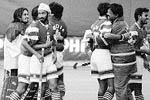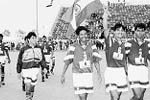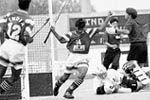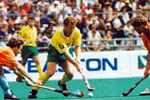|
November 3, 1997
NEWS
MATCH REPORTS
STAT SHEET
DIARY
OTHER SPORTS
SLIDE SHOW
DEAR REDIFF
|
The Hockey Interview/V Bhaskaran
'Hockey is not dying, it is being killed'
 He lives in a home that is, appropriately enough, called 'Hockey House'.
He lives in a home that is, appropriately enough, called 'Hockey House'.
And the home of Padma Shri V Bhaskaran, in suburban Madras, is becoming something of a landmark these days. Earlier, he was known mostly to middle-aged hockey afficionadoes, as the man who led the Indian team to an Olympic gold in 1980.
His name, though, got a fresh lease of life when the national junior hockey squad returned from England with a silver medal in the World Cup -- an achievement that, coming totally out of the blue, has given Bhaskaran the aura of a supercoach and, who knows, as perhaps the man to turn to as the country seeks to revive past glories.
Bhaskaran spoke to Shobha Warrier on the game he loves, and is intensely involved in. Excerpts:
The performance of the junior hockey team has come as something of a pleasant surprise. Did you sense their potential the
moment you started coaching them?
Till last year, I was not very optimistic about the talent
that is there is in the team. It all started like this: I wanted
at least 35 boys in the team, which is normally
not accepted. But IHF president K P S Gill, secretary Jyothi Kumaran and
the government came to my rescue, and we were enabled to pick up quite
a few very talented boys for training.
Rajeev Mishra, one of the stars of the Junior World Cup, is being touted as your discovery. Where did you find him?
Rajeev Mishra and a couple of other youngsters, like Barla, play for my team, Railways. It is not a question of my having 'discovered' them -- they were talented to start with, so it was easy for me and Ramesh Parameswaran
to coach them well.
You say you were not optimistic at the outset. So when did you begin to realise the team was talented?
 See, hockey is played by almost all Indians. Players from other
countries always say that dribbling is inborn in Indians and Pakistanis.
So, the talent is already there, otherwise they wouldn't have entered the Sports Authority of India programme. What I was looking for was something else -- discipline, and I mean discipline on the ground. That
was where I gave the stress, and when I began finding what I was looking for, I was much happier.
See, hockey is played by almost all Indians. Players from other
countries always say that dribbling is inborn in Indians and Pakistanis.
So, the talent is already there, otherwise they wouldn't have entered the Sports Authority of India programme. What I was looking for was something else -- discipline, and I mean discipline on the ground. That
was where I gave the stress, and when I began finding what I was looking for, I was much happier.
With India having won the silver at the Junior World Cup, are you happy with the way the team has performed, or did you expect them to take the title?
I will not say I am completely happy with their performance -- there are still problem areas, weaknesses to overcome.
Converting penalty corners into goals, for instance?
Yes, that is one area, another is our tendency to hang on to the ball. But yes, you are right, penalty corners are not
taken with alertness -- that was quite evident, especially in the finals.
We had about ten penalty corners, but what happened? In the earlier
matches, the boys were confident of recovering. But the confidence
was absent in the finals.
How do you view India's loss in the finals; was it because
of the lost opportunities or was it just a case of the better team
winning the match?
 I wouldn't say Australia is a better team -- they were equal, that's all.
Maturity-wise, though, Australians were a better side. They are never
under pressure, they play in the true spirit of the game. It is
not so with our boys. Even before we started the tourney, we had to answer media questions
about whether we would win the cup or not. That kind of thing puts a lot of pressure
on the boys.
I wouldn't say Australia is a better team -- they were equal, that's all.
Maturity-wise, though, Australians were a better side. They are never
under pressure, they play in the true spirit of the game. It is
not so with our boys. Even before we started the tourney, we had to answer media questions
about whether we would win the cup or not. That kind of thing puts a lot of pressure
on the boys.
Is criticism more virulent in India than in other countries, especially when a team loses?
Yes, most definitely. People here should understand that
a sportsperson is first and foremost a human being, and that humans are prone to errors.
Okay, if a player is is not playing well at all, you can criticise. But
here, if you don't play well in one match, they behave as if you
have never played well at all. People tend to forget earlier
performances, victories.
So, are you saying that public expectations put pressure on the players?
More than the public, it is the press that whips up expectations. The media screams for blood all the time. I have found that teams from
the other countries do not go out to win everything, they go to perform, and the public there is happy when they perform well, they don't bother so much about defeat or victory. In other countries, you don't have victory parades, stuff like that -- the people there consider it as a sport. Here, however, things are different, the media makes a big thing only of wins and losses. But the game cannot be mastered through the media's pen -- and to my mind, it is this that is affecting the game.
There is lots of talk about employing foreign coaches. What is your opionin about that?
 I won't say Indian coaches are bad and European coaches
are very good. The big difference between our coaches and the European ones is that they are the real bosses, they occupy a position above the federations and the governments, they are appointed on a four-year basis and for that period, their word is what matters. So they have a free hand to develop talent, which we don't have.
I won't say Indian coaches are bad and European coaches
are very good. The big difference between our coaches and the European ones is that they are the real bosses, they occupy a position above the federations and the governments, they are appointed on a four-year basis and for that period, their word is what matters. So they have a free hand to develop talent, which we don't have.
What are your coaching methods?
First, I make them play at least two games of twenty minutes duration
per week. In each game, I assign one job to one player, and he has to do only
that in that particular match. The jobs are rotated, so that everyone learns to do everything.
What you have to do on astroturf is, save your energy. You
should not run with the ball and lose a lot of your energy. We
play a lot of loose hockey in India, we believe that dribbling a lot is what makes us heroes and gets us written about. That is not hockey. The game is about eliminating
the defender in the simplest way, so that you don't waste your energy. It is the fastest game played in the world now, and energy is the key to it.
I feel, besides, that watching games
played by others is important. So, I show my boys video cassettes of various
European and Indian matches, help them improve their skills by watching others play. I also give a lot of importance to midfield play, the correct way of passing, that kind of thing. And for that, I create game situations, set pieces.
We also have a doctor to monitor their fitness, a physio to help improve their body awareness and skills.
Are you qualified to coach?
Yes, I did both the preliminary and advanced coaching courses conducted by the FIH. The preliminary was in Spain, and the
final in Madras. Out of the 35 people who attended the preliminary
courses, 16 were selected for the final camp, and I can proudly claim that I am the first Indian to get Grade-I coaching status. Besides, I watch a lot of hockey on video to update my knowledge
of the game, which is essential as the rules are changing very fast.
At one time, the subcontinent with its stylistic play and soft touch dominated international hockey. Now it is the aggressive play of the European nations that dominate. Any comments?
 I like the Australian style of hockey because they play more or less
like us. However, I don't enjoy the style of other European nations like Germany and Holland -- the only good thing about them is their skill in converting penalty corners into goals. I am not denying the importance of that, but merely pointing out that ideally, hockey should be a mix of the Asian skills and European finishes. Another problem I have is that European hockey, with its man to man marking and rough tactics, tend to create a situation where the game is less skilful, more physical. Like rugby.
I like the Australian style of hockey because they play more or less
like us. However, I don't enjoy the style of other European nations like Germany and Holland -- the only good thing about them is their skill in converting penalty corners into goals. I am not denying the importance of that, but merely pointing out that ideally, hockey should be a mix of the Asian skills and European finishes. Another problem I have is that European hockey, with its man to man marking and rough tactics, tend to create a situation where the game is less skilful, more physical. Like rugby.
Wasn't hockey a great crowd puller once? Where did we go wrong?
Yes, when Pakistan came here in 1978, around 30,000 people went
back, unable to get tickets. We were playing in the Chinnaswamy
Stadium in Bangalore. Again, in Bombay, the entire Wankhede Stadium was
full. The same was the case in Karachi and Lahore too. In those days,
there was a lot of good hockey, lots of skill, hockey was pleasing to the eyes, so the crowds came. These days, the European style dominates, and it is not, unfortunately, visually appealing. So the crowds have thinned out.
We Indians supposedly lack the killer instinct... what are your thoughts about that?
 See, everybody plays for his country. But when we lose, people
say we did not play for the country. If Sachin Tendulkar does not get runs every single time he plays, people
start talking. The trouble with us is, we talk without thinking. If you go
out and see how other countries win, you will understand the difference.
Building a team is like building a house -- and a house is
complete only after its foundation, walls, windows, doors and
compound walls are complete. It takes some time to build a house,
it has to be done brick by brick. Likewise, it takes time to build
a good hockey team or a good football team or a good cricket team. It cannot be done overnight -- but that is what the public seems to expect.
See, everybody plays for his country. But when we lose, people
say we did not play for the country. If Sachin Tendulkar does not get runs every single time he plays, people
start talking. The trouble with us is, we talk without thinking. If you go
out and see how other countries win, you will understand the difference.
Building a team is like building a house -- and a house is
complete only after its foundation, walls, windows, doors and
compound walls are complete. It takes some time to build a house,
it has to be done brick by brick. Likewise, it takes time to build
a good hockey team or a good football team or a good cricket team. It cannot be done overnight -- but that is what the public seems to expect.
At this point, I think I have to make another point -- it is not easy to coach in India. We have something like 50 languages, communication is not easy, but all these aspects are totally ignored by us. Here, we lose, people blame the coach. I am, for instance, from Madras, have played hockey for
the country from 1969 onwards. Do you know I could not communicate
with my fellow players for a long time because I didn't know
Hindi? I didn't know how to ask for a glass of water in Hindi.
I learnt, but slowly. If I cannot communicate with my team mates, where will cohesion come from? The same is the case as a coach -- I have boys from Punjab, Haryana, Bombay, Calcutta, Tamil
Nadu, Karnataka, Uttar Pradesh and Madhya Pradesh. I am fluent now in Hindi and Punjabi, but look how many languages I would need to know to really be able to converse with all the boys in the languages they are most comfortable in!
Hockey, today, is our national game in name only, while it is cricket and tennis that get all the attention. How did this happen?
As long as a sports federation is funded by the government,
it is bound to happen. In cricket, who is spending all the money?
The BCCI. And it doesn't go to the government for clearance each time it needs to conduct a tournament. But that is not the case with hockey, and other sports. I have travelled to
almost all parts of the world in the last twenty years, and I can
assure you that we have an abundance of talent as opposed to other countries. The biggest problem
is that here, even nurturing the boys is done through the government.
If a 14-year-old boy is found to be extremely good in chess, he
is not sent for any tournament because his name has to first go
to the government for clearance, and it takes six months for him to get a response, by which time he may even have crossed the age limit, left the game out of sheer frustration, whatever. Mahesh Bhupathi
did not become Mahesh Bhupathi in India. It so happened that his father was in the Gulf, could afford to finance him on tours -- but how many talented young players do we have, who are not that lucky?
A game will improve only if somebody is interested in backing it. Corporate
houses love to sponsor cricket, and one reason is because the BCCI aggressively markets the game. We, however, sit in our seats and lament that nobody is coming
forward to help hockey. Even now, hockey is popular. In England,
10,000 people watched the game between India and Australia. What
more do you want? Our trouble here is that we do not promote and market the game.
Are you saying that aggressive marketing alone will bring people back to the stadium?
 Definitely! Hockey is not dying, it is being killed. And worse, we have no proper plan to bring it back to life. Take the case
of one-day cricket. Why are they playing day and night matches,
and not 10 to 5 matches? Because people in India are free to watch sports only in the evening. So cricket games are played under lights, and the people throng to the stadia.
The finals of a tournament are scheduled depending on how the television bosses want it, what time is best for viewership. All this for cricket. And hockey? Hell, we have games played at ten o'clock in the morning, at three o'clock in the afternoon, who is going to come and watch?
Definitely! Hockey is not dying, it is being killed. And worse, we have no proper plan to bring it back to life. Take the case
of one-day cricket. Why are they playing day and night matches,
and not 10 to 5 matches? Because people in India are free to watch sports only in the evening. So cricket games are played under lights, and the people throng to the stadia.
The finals of a tournament are scheduled depending on how the television bosses want it, what time is best for viewership. All this for cricket. And hockey? Hell, we have games played at ten o'clock in the morning, at three o'clock in the afternoon, who is going to come and watch?
What are your own immediate goals? Are you content coaching the juniors, or do you prefer to step up, to the senior level?
I think I need a promotion. I have a lot of confidence
in myself as a coach, I am confident I have been getting good results, and I am pretty sure it is time, now, for me to take over the senior team.
Pictures courtesy: www.fieldhockey.com
|

